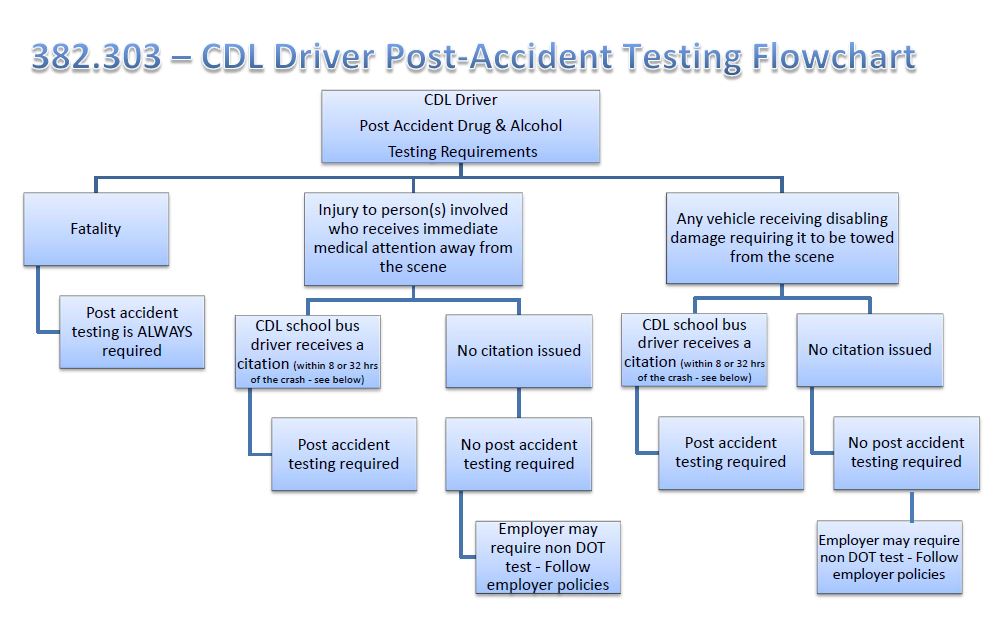Last updated : April 7, 2025
There is a lot going on up front and behind the scenes with the Department of Transportation (DOT). USA Mobile Drug Testing of Northeast Ohio would like to inform you of relevant updates that have occurred throughout the year, as well as updated DOT deadlines as we approach the end of 2020. We hope you find this information helpful for your business!

Federal Department of Transportation Chain of Custody Form Updates
The Federal Department of Transportation chain of custody form has recently been updated. What is newsworthy about this is that the form now includes boxes to check for oral fluid testing! Although oral fluid testing has not yet been approved as a method for conducting DOT drug testing, it is definitely a step in the right direction and bodes well for the future approval of saliva testing for the DOT.
FMCSA/DOT Clearinghouse Limited Queries
For the FMCSA/DOT Clearinghouse, remember that you have until December 31, 2020 to perform your LIMITED QUERIES on all of your existing employees. They do NOT have to register on the Clearinghouse website, but you must have their signed consent on file in order to perform the queries. If USAMDT of Northeast Ohio is your C/TPA, we would be happy to run your limited queries for you for a nominal fee. Please contact us here.
Department of Transportation COVID-19 Updates
Before the COVID pandemic struck, if you were an FMCSA/DOT employee and were off work or furloughed for more than 90 days, you were required to take a pre-employment drug test before returning to work. That requirement was waived (with the guidelines below) but now expired effective September 30, 2020.
- Currently, pursuant to 49 CFR 382.301(a), prior to the first time a driver performs safety sensitive functions for an employer, the driver must undergo pre-employment testing for controlled substances and the employer must receive a verified negative controlled substances test result for that driver from a medical review officer or a consortium/third party administrator. This requirement also applies each time a driver returns to work after a furlough, lay-off, or other period of unemployment when the driver does not continue to be subject to random controlled substances testing in accordance with 49 CFR 382.305. Section 382.301(b) provides an exception allowing an employer to forgo administration of a preemployment test if the driver has participated in a controlled substances testing program that meets the requirements of 49 CFR part 382 within the previous 30 days; and, if while participating in that program, the driver either: (i) was tested for controlled substances within the past 6 months or (ii) participated in the random controlled substances testing program for the previous 12 months. In addition, under the exception, the employer would be required to ensure that no prior employer of the driver has records of a violation of 49 CFR part 382 or the controlled substances use rule of another DOT agency within the previous six months. As employers begin to recall drivers who were furloughed, laid off, or otherwise not working for the company for more than 30 days, the cost and logistical barriers of testing a large influx of drivers in a short timeframe are significant, at a time when the commercial trucking and motor coach industry is facing unprecedented economic challenges. This problem is further compounded by the reduced availability of controlled substances testing resources due to continued facility link closures or other testing impediments caused by the COVID-19 public health emergency.
Other changes that were originally scheduled to expire on September 30, 2020, have been extended to December 31, 2020, include:
- SAP (Substance Abuse Professional) assessments have traditionally been required to be held in person, and that is still ODAPC’s preference, but they can be held remotely for now, due to social distancing, but must meet specific guidelines that have been set forth to insure satisfactory two-way communication
- Service Agents in the industry (collector’s, BAT’s, STT’s, SAP’s and MRO’s) are required to maintain their certifications in order to support DOT drug and alcohol testing. If any of these agents’ certifications expire before the end of the year, the DOT will still consider them certified if they are unable to re-certify due to lack of programming availability due to COVID-19
DOT/FMCSA Post-Accident Testing Criteria
You may sometimes ask yourself “when do I need to do Department of Transportation (DOT) post-accident testing” when your driver is involved in an accident. Frequently you may not need to, but you may elect to do a non-DOT test, just to be on the safe side.
A TRUE DOT post-accident test must meet the following criteria:
- There is a fatality; or
- The driver is cited for a moving violation AND either:
a. The vehicle is towed from the scene; or
b. Someone is medically evacuated from the scene
In these cases, the surviving driver is tested. FMCSA regulations do not call for testing of deceased drivers.
If you would still like to test even though the incident does not meet DOT guidelines, please call USA Mobile Drug Testing of Northeast Ohio at 440/653-5003, option 1, and we will be happy to come out and perform an instant NON DOT drug test and a NON DOT alcohol test. We have a new “DOT look-alike” test that tests for the same drugs as the DOT panel to keep everything consistent. If the test results are negative, the driver can go right back to work. If non-negative, a sample would need to be sent to the lab, and the driver could not return to work until the results were processed at the lab and released by the Medical Review Officer (MRO).
PLEASE NOTE that if a DOT drug test needs to be performed based upon the criteria above, NON DOT testing cannot be performed in addition to the DOT test. Please refer to the flow chart linked here/image pasted below.
We are here for you 24/7, so please feel free to call us at any time for any and all drug testing and alcohol testing needs you may have! You can also get in touch with us via email here.

Articles referenced to create this article can be found below:
DOT Guidance on Compliance with DOT Drug and Alcohol Testing Regulations
Three-Month Waiver in Response to the Economic Consequences of the COVID-19 Public Health Emergency
Mandatory Guidelines for Federal Workplace Drug Testing Programs-Oral/Fluid